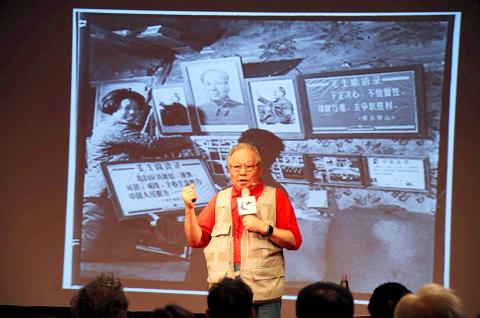The historical record of the horrors of the Cultural Revolution must be remembered as a warning to future generations, said Chinese photographer Li Zhensheng (李振盛), who chronicled events of the time.
“I jokingly call myself the evangelist of the Cultural Revolution, because all human-caused disasters should be kept as part of humanity’s collective heritage,” Li told a lecture organized by the Lung Yingtai Cultural Foundation in Taipei on Thursday.
In the 1960s, he worked as a photojournalist for the Heilongjiang Daily as the fervor of the Cultural Revolution was “sweeping across China like wildfire,” he said.

Photo: CNA
He took nearly 100,000 photographs during that time, he said.
The Chinese Communist Party (CCP)-run newspaper selected only “positive” images for publication, with about 20,000 of Li’s images deemed “negative” and left unused, he said.
Later, sensing that the political winds were turning against him, he hid the unwanted photos — which he dubbed “the useless pictures” — under floorboards in his apartment and told a trusted friend that he was to preserve them should anything happen to him, Li said.
The friend honored his promise and the images later formed the basis of his critically acclaimed body of work, including the book Red-Color News Soldier published in 2003 in the US, the UK, France, Germany and Japan, among other countries.
Many of the photos were taken at struggle sessions and became a record for the madness and folly of the Cultural Revolution, Li said.
Some of the events he captured included the humiliation of then-Heilongjiang provincial governor Li Fanwu (李范五), whose crime was imitating Mao Zedong’s (毛澤東) hairstyle and whose punishment was the humiliation of being shaven half-bald in public.
Another image Li Zhensheng showed was that of an engineer accused of being a Soviet revisionist, because posters he created used the words “to the North.”
He was executed, Li Zhensheng said.
An absurd episode he witnessed revolved around a couple who hung a portrait of Mao over their bed, leading to accusations that they had disrespected him, Li said.
At their struggle session, the couple claimed that they had sex in the dark, but then they were accused of having something to hide from Mao, so the couple changed their story to say they always keep a light on, he said.
The roles of prosecutor and defendant could change hands swiftly and every person alive at that time had been both, he said, adding: “There was no such thing as a good person during the Cultural Revolution.”
“I led struggle sessions against my own colleagues at the paper; a year after that I traded places and became the struggle sessions’ subject,” he said.
About 30 years after hiding the photos, he received a prize for the no-longer-secret collection.
Afterward, a former colleague told him that those who had wholeheartedly followed the CCP only documented half of the history.
The former colleague “said that my heart was less than one-third full of the party, so I got the full picture,” Li said.
“There is light and dark to every period of history, and it was the useless pictures that reconstructed the reality of the Cultural Revolution,” Li said.
“I record the misery to prevent it from happening again,” he said. “Tragedies are remembered in history so that we do not repeat them.”

The Sports Administration yesterday demanded an apology from the national table tennis association for barring 17-year-old Yeh Yi-tian (葉伊恬) from competing in the upcoming World Table Tennis (WTT) United States Smash tournament in Las Vegas this July. The sports agency said in a statement that the Chinese Taipei Table Tennis Association (CTTTA) must explain to the public why it withdrew Yeh from the WTT tournament in Las Vegas. The sports agency said it contacted the association to express its disapproval of the decision-making process after receiving a complaint from Yeh’s coach, Chuang

The Hualien Branch of the High Court today sentenced the main suspect in the 2021 fatal derailment of the Taroko Express to 12 years and six months in jail in the second trial of the suspect for his role in Taiwan’s deadliest train crash. Lee Yi-hsiang (李義祥), the driver of a crane truck that fell onto the tracks and which the the Taiwan Railways Administration's (TRA) train crashed into in an accident that killed 49 people and injured 200, was sentenced to seven years and 10 months in the first trial by the Hualien District Court in 2022. Hoa Van Hao, a

Control Yuan Secretary-General Lee Chun-yi (李俊俋) tendered his resignation last night, admitting that he had misused a government vehicle, as reported by media. His resignation was immediately accepted by the Control Yuan. In a statement explaining why he had resigned, Lee apologized for using a Control Yuan vehicle to transport his dog to a pet grooming salon on May 20. The issue first came to light late last month, when TVBS News reported that Lee had instructed his driver to take the dog to the salon. The news channel broadcast photos that it said were taken by an unnamed whistle-blower, which purportedly showed the

Taipei has once again made it to the top 100 in Oxford Economics’ Global Cities Index 2025 report, moving up five places from last year to 60. The annual index, which was published last month, evaluated 1,000 of the most populated metropolises based on five indices — economics, human capital, quality of life, environment and governance. New York maintained its top spot this year, placing first in the economics index thanks to the strength of its vibrant financial industry and economic stability. Taipei ranked 263rd in economics, 44th in human capital, 15th in quality of life, 284th for environment and 75th in governance,